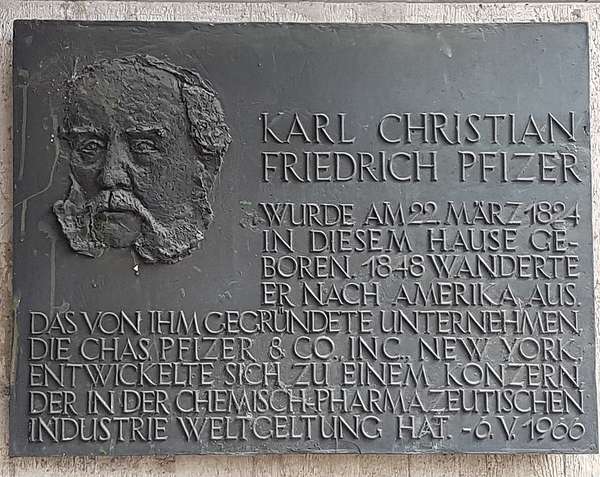Charles Pfizer & Company - How two entrepreneurs from Ludwisgburg, Germany founded a global corporation
- 19. October 2021 - Emigration, General, German-American, Historical Events, Knowledge, Personalities
The pharmaceutical company Pfizer is one of the largest in the world and internationally known - currently especially due to the cooperation with BioNTech in the development, production and distribution of the first vaccine against COVID-19 "Comirnaty" (usually better known under the company name BioNTech), which was approved in the US, Europe and many other countries. But did you know that the company was founded in the US in 1849 by two people from Ludwigsburg, Germany?
Karl Pfizer and Karl Erhart
Karl Christian Friedrich Pfizer, later Charles Pfizer, was born in Ludwigsburg, Württemberg, Germany on 22 March 1824 and died on 19 October 1906 in Newport, Rhode Island, USA. He was the 5th child and only son of the confectioner and grocer Karl Frederick Pfizer and his wife Caroline née Klotz. While still in Germany, he had commercial training and was a pharmacist's apprentice.
His cousin Karl Friedrich Erhart, later Charles F. Erhart, was also born in Ludwigsburg on 12 September 1821, so he was slightly older. He died in Brooklyn on 27 December 1891. Charles Erhart was a confectioner and married Pfizer's sister Frances "Fanny" Pfizer in 1856.
It is not entirely clear exactly when the cousins emigrated (probably around 1848, Charles Pfizer himself gave the year 1849 from Bremen when applying for passports), but it seems that they already had the plan for the business when they emigrated. According to a daughter of Charles Pfizer, the reasons for emigration were probably mainly the better (economic) opportunities and freedoms offered in the USA (see the very interesting article by William H. Stevenson, III on the website Immigrant Entrepreneurship). So, despite the appropriate time period, they were probably not so-called "Forty-Eighters" who fled Germany because of the failed revolution of 1848/1849 (For more information on this topic, see here).
A flourishing chemicals business
Karl Pfizer and Karl Erhardt founded Charles Pfizer & Company in the then independent and heavily German Williamsburg in 1849. To do so, they borrowed money from Pfizer's father. Chemical manufacturing was still in its infancy in the USA at the time, and competition was therefore limited.
At first, the cousins produced Santonin (a drug against parasitic worms). Their respective professions helped, as the pharmaceutical product was marketed in a novel form: As a toffee-flavored sugar-cream-cone. In the beginning, it was apparently delivered personally by Charles Pfizer.
Success came quickly and the product range was steadily expanded, although from now on more in the area of fine chemicals that were sold to wholesalers and retailers. Mostly raw materials were refined instead of chemicals being synthesized. The products were often used not only for medical purposes but also for many other purposes. The company itself was also expanded from 1854/1857 onwards, with the addition of new production facilities, administrative buildings and warehouses. And in 1882, as the first place outside New York, a sales office in Chicago was opened.
A factor in the company's success was also the outbreak of the American Civil War (1861-1865). Demand for many of the products manufactured by the company increased while at the same time foreign trade collapsed. Subsequently, high import duties continued to promote the company's growth. Among other things, the "Manufacturing Chemists' Association", founded by Pfizer and other chemical manufacturers in 1872, ensured this.
The company also benefited from Pfizer's clever use of opportunities, as well as the company's reputation for delivering particularly high quality ("Pfizer quality"). Good contacts in Germany and Europe with raw material suppliers, etc., did the rest.
Although he became a U.S. citizen in 1956, he was frequently in Europe for business and social reasons. On one of these trips Pfizer met his wife Anna Hausch, whom he married in Ludwigsburg in 1859. Together they had a total of 7 children, 5 of them reached adulthood: Charles Jr. (1860-1928), Gustave (1861-1944), Emile (1864-1941), Helen (born 1866) and nestling Alice (born 1877). Gustave, Helen and Alice later lived abroad, Gustave mainly in Paris, the daughters married aristocratic men from Britain and Austria.
Around 1880, the company began producing citric acid, which was needed, for example, in the emerging soft drink industry and was to become one of its mainstays.
After Erhart's death in 1891, Charles Pfizer initially became sole owner of the company. By this time, two of his own sons, Charles Pfizer Jr. and Emile Pfizer, and the son of his former business partner, William H. Erhart (1868-1940), had already joined the company. Nevertheless, a year after his partner's death, Charles Pfizer Sr. appointed longtime employee John Anderson as general manager and started to withdraw from the company.
In 1900, the company was incorporated. The shares went equally to his two sons as well as William Erhart; John Anderson also received a share, which allowed him to sit on the board of directors. Charles Pfizer Jr. became president of the company, but was removed from office as early as 1905 because he had proved unfit for the position. His brother took over the presidency and, as the last remaining family member in the company, filled it until 1941. Anderson was given a free hand in running the company, officially serving as chairman from 1914 to 1929. William Erhart then took over the post (until his death in 1940).
Charles Pfizer died in 1906 after falling down the stairs at his home in Newport. His company was by then one of the largest specialty chemical manufacturers in the country. It remained in private hands until 1942, when shares were offered to the public.
The path to becoming one of the world’s largest pharmaceutical companies
Innovations such as the production of citric acid by fermentation in 1919 or the development into one of the leading vitamin manufacturers led to further growth of the company even after the death of the two founders. But it was not until the large-scale production of penicillin during World War II that the company's real transformation from a fine chemicals manufacturer to one of the world's largest pharmaceutical companies began. This was followed by increasing internationalization in the 1950s. Among other things, the company achieved great fame through the invention of Sildenafil (marketed by Pfizer from 1998 as a drug under the name Viagra). Unfortunately, however, there were also some controversies and court cases over the years.


24. November 2021
Dear Lee,
we had several sources, among others the one with a link in the text. While we of course check our facts as far as reasonable and to our best knowledge, we do not aim to deliver scientific historical papers and have therefore decided a long time ago not to work with footnotes and long lists of sources. If you are interested in the source of a specific information, please let us know and we can try to give you more information.
Best regards from the Beyond History Team
18. November 2021
can you show the source please ?